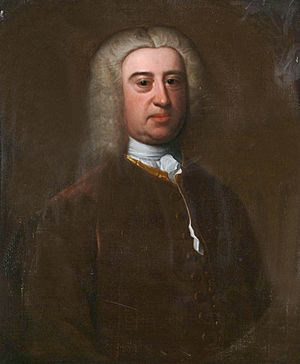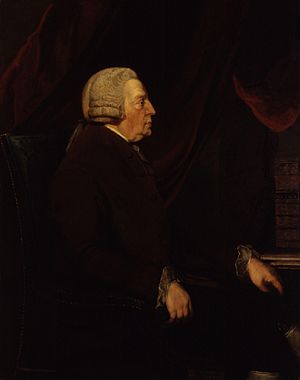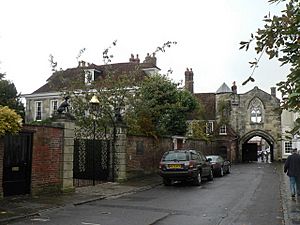James Harris (grammarian) facts for kids


James Harris, a member of the Royal Society, was an important English politician and writer. He lived from 1709 to 1780. He is best known for his book Hermes, a philosophical inquiry concerning universal grammar (1751). This book explored how language works.
Contents
Life of James Harris
James Harris was born in Salisbury, Wiltshire, England, on July 24, 1709. His father was also named James Harris, and his mother was Elizabeth. He went to school at Salisbury Cathedral School. Later, he studied at Wadham College, Oxford University. After university, he began to study law, but he didn't plan to become a lawyer. In 1733, his father passed away. This meant James Harris inherited money and a home called Malmesbury House in Salisbury.
His Political Career
Harris became a local judge. He was elected to the British Parliament for the area of Christchurch. He served as a Member of Parliament (MP) from 1761 until he died. From 1774 to 1780, he was the Comptroller to the Queen. This was an important role in the royal household. He also held other government jobs. In 1763, he became a lord of the admiralty, helping to manage the navy. Later that year, he became a lord of the treasury, which involved managing government money. He left these roles in 1765.
In 1763, James Harris was chosen as a Fellow of the Royal Society. This is a group for top scientists and thinkers. He died at Malmesbury House on December 22, 1780. He was buried in Salisbury Cathedral. There is a special memorial there to remember him.
His Friends and Interests
James Harris loved music, especially the works of the famous composer Handel. He was a good friend of Handel. For almost 50 years, Harris helped organize concerts and music festivals in Salisbury. He also wrote words for music pieces by Italian and German composers. These were later published. He wrote several short plays called pastorals. One of them, Damon and Amaryllis, was performed in London. It was the first big performance for a singer named Thomas Norris. Norris was a talented singer from Salisbury whom Harris had helped.
Other Connections
Harris exchanged letters with interesting thinkers. One person he wrote to was Lord Monboddo, who shared some early ideas about evolution. Not everyone liked Harris. The famous writer Samuel Johnson thought Harris was a bit proud. He said Harris was "a sound, solid scholar," but also "a prig" and "a coxcomb." However, the music historian Charles Burney greatly respected Harris's writings about music. In 1775, Harris and his family attended a concert at Burney's house. Burney's daughter, Frances (Fanny) Burney, wrote about it. She said Harris was "very cheerful and communicative." She also said his conversations were "instructive and agreeable." Harris even played music while his daughter Louisa sang.
His Writings
James Harris was very interested in old Greek and Latin books. He studied many old manuscripts and printed books. His uncle, the 3rd Earl of Shaftesbury, also influenced his ideas. In 1744, Harris published a book called Three Treatises. It covered topics like art, music, painting, poetry, and happiness. His most famous book, Hermes, a philosophical inquiry concerning universal grammar, came out in 1751. This book looked at the rules of language and how grammar works. It even influenced Robert Lowth's English grammar book, which was published in 1762. Harris also wrote Philosophical Arrangements and Philological Inquiries. After he died, all his works were collected and published in 1801 by his son, James. His son also included a short story about his father's life. Today, Harris's old papers and letters are kept at the Hampshire Record Office.
His Family
In 1745, James Harris married Elizabeth Clarke. She was the daughter of John Clarke. They had two sons and three daughters. Their older son, James Harris, 1st Earl of Malmesbury, became a famous diplomat.
 | Aaron Henry |
 | T. R. M. Howard |
 | Jesse Jackson |


